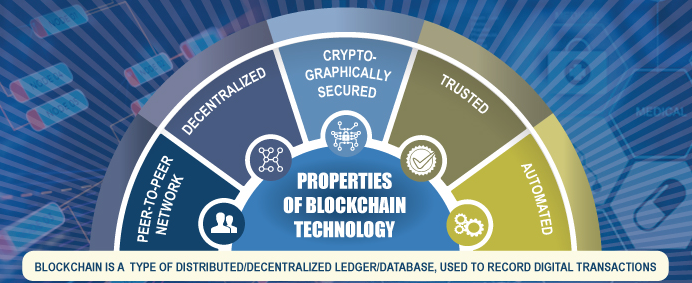Products

Who We Serve
November 13, 2018
Interoperability. Healthcare cost savings. Data security. Healthcare innovation…and blockchain. Today it’s difficult to talk about any of these hot topics without hearing about the others.
Systems interoperability that would provide nationwide access to a common database of health information — no matter what EHR is used — is healthcare’s holy grail. Healthcare leaders, physicians, medical researchers and yes, patients, are frustrated by our inability to share the massive healthcare information we collect via our millions of data systems, and do so less expensively and more securely. Many technology leaders think blockchain will disrupt this inefficient status quo and even revolutionize healthcare. Is blockchain just another tech pipedream du jour? It seems not. A significant number of hospital leaders are already blazing the trail with blockchain solutions. Here’s what you should know.
Blockchain: A Quick Description
The concept behind blockchain, as described by Wired, includes three main components: a widely distributed network, a shared ledger with validated access identities, and digital transactions. A blockchain is an open, continuous, and secure ledger stored online that can’t be altered. Rather than having one central administrator that acts as a gatekeeper to data—a list of digital transactions—there’s one shared ledger, but it’s spread across a network of synchronized, replicated databases visible to anyone with access (my italics). Blockchains live on many individual devices instead of existing on central hubs. Authorized sharing in the immutable and verifiable properties of blockchain allow for an interoperable environment that thus far has not been achieved using traditional approaches that rely on centralized servers or data storage.
Frost & Sullivan depicted blockchain in a 2017 report, as shown below:

Healthcare Leaders Are Expanding Their Knowledge of Blockchain, Resulting in Plans for Adoption.
Frost & Sullivan also noted that “For many people (across different industries), the blockchain concept remains difficult to grasp—which makes it one of the most misunderstood technologies.” A late 2017 Black Book research study of healthcare executives found that their understanding of blockchain and its potential was developing, but only 29 percent of hospital leaders said they had a working understanding of the technology. But by late 2018, interest has jumped. Deloitte has reported that just under three-quarters of healthcare executives (providers and payors) now describe their understanding as “excellent” or “expert.” Nearly half of executives surveyed in a PWC Health Research Institute study said that their organizations plan to develop or adopt blockchain solutions.
Nevertheless, PWC study participants said several barriers must be overcome: lack of trust among users, regulatory uncertainty, governance difficulties, and concerns about the ability to bring the network together, ensure interoperability and scale solutions. As one example, 61 percent of healthcare companies reported their blockchain projects were challenged by a lack of appropriate internal skills. Another example: since a blockchain solution involves multiple participants and no single owner, creating a mutually agreeable governance structure is challenging. Forty-three percent of technology executives surveyed by PWC said their ability to progress further with blockchain had been hindered by a lack of governance structure.
Potential Benefits of Blockchain in Healthcare
Blockchain trailblazers expect that key benefits will be a major reduction of imperfect information and information risks (e.g. security breaks) and a bounty of speedily accessible information. As an example, a blockchain-based system would speed up data processes needed for provider and payer credentialing so that what now takes weeks or months could be reduced to days. Credentialing and provider directory update processes today are also inefficient and costly. The $2 billion a year that payors spend on maintaining provider databases (per the Council for Affordable Quality Healthcare) could be reduced by 75 percent using blockchain.
Dramatic improvements in speedy and accurate information access, in turn, will enable health professionals to safely track, analyze and use health information across disparate providers and systems. Follow-on benefits are many, including the ability to create an accurate Master Patient Index which is now a worrisome impossibility; high integrity revenue  cycle tracking which could greatly reduce unnecessary costs; reduction in medical errors, estimated to be the third leading cost of deaths in the United States; more efficiencies for physicians including spending more time with patients and less on admin; and sharing of resources and analytics across pharma and biotech researchers to expand disease identification capabilities and develop better preventative and therapeutic solutions.
cycle tracking which could greatly reduce unnecessary costs; reduction in medical errors, estimated to be the third leading cost of deaths in the United States; more efficiencies for physicians including spending more time with patients and less on admin; and sharing of resources and analytics across pharma and biotech researchers to expand disease identification capabilities and develop better preventative and therapeutic solutions.
The interoperability enabled by blockchain is especially promising for its potential to transfer relevant patient data from one provider to another no matter the location or the providers’ particular EHR. For physicians, this would enable co-development of customized treatment plans by a patient’s various caregivers, based on full histories, genetics, and environment.
Blockchain would also enable improvements and cost savings in many healthcare processes. For example, blockchain combined with other technologies would enable major efficiencies in the claims process and improve the overall healthcare experience for all stakeholders. Health researchers would have access to broad, comprehensive data sets to advance the understanding of disease, and accelerate biomedical discovery and drug development.
John Halamka, Chief Information Officer of Beth Israel Deaconess Medical Center in Boston and the Editor-in-Chief of Blockchain in Healthcare Today has noted that the decentralization of data that blockchain enables will ensure data integrity. Forbes recently cited three prominent opportunities gleaned from an interview with Halamka:
Sound Too Good To Be True? It’s Not.
Many organizations in the healthcare arena are making strategic and financial commitments to potential blockchain solutions. The global healthcare blockchain market is estimated to experience double-digit growth to $5.61 billion by 2025, according to an April 2018 report from ResearchAndMarkets.com. New initiatives abound. Examples include:
There is no silver bullet for our healthcare challenges. But innovative blockchain solutions are expected to solve many issues that plague our data-siloed industry.
Obstacles abound in a forecast of blockchain’s eventual role and value in healthcare, not unlike every disruptive technology or initiative in healthcare IT’s evolution. More understanding of this esoteric subject is needed. Technical standards need to be agreed upon and secured. EHR and related tech industry leaders need to expand healthcare priorities beyond their company profit borders, especially in the area of interoperability. Priorities must be balanced throughout the industry.
Despite opportunities that blockchain may present, the biggest elephant in the room is that healthcare industry change remains slow. Healthcare organizations justifiably must put direct patient care first, with payment for it a close second. But the rise of initiatives in value-based care, data analytics, artificial intelligence solutions, e-health, telemedicine, and population health management is already carving a path into healthcare’s future, offering significant potential for helping us build a superior national healthcare system. Many healthcare leaders are now betting on blockchain to help smooth the way.